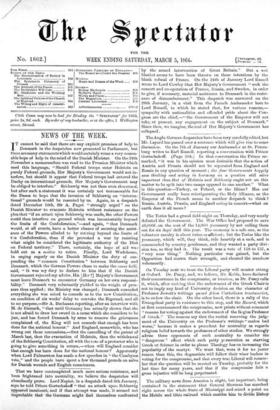NEWS OF THE WEEK.
IT cannot be said that there are any explicit promises of help to Denmark in the despatches now presented to Parliament, but there aremany statements which would certainly rouse a very reason- able hope of help in the mind of the Danish Minister. On the 24th November a memorandum was read to the Prussian Minister which used this language, " Should Federal troops enter Holstein on purely Federal grounds, Her Majesty's Government would not in- terfere, but should it appear that Federal troops had entered the Duchy on international grounds, Her Majesty's Government may be obliged to interfere." Schleswig was not then even threatened, but after such a statement it was certainly not unreasonable for the Danes to hope that the invasion of Schleswig on "interna- tional" grounds would be resented by us. Again, in a despatch dated December 10th, Sir A. Paget " strongly urged " on the Danish Minister to evacuate Holstein without resistance on the plea that "if an attack upon Schleswig was made, the other Powers could then interfere on ground which was incontestably beyond the limits of the Confederation,"—and again, " that Denmark would, at all events, have a better chance of securing the assist- ance of the Powers alluded to by retiring beyond the limits of t'us Confederation, than if she provoked a war by resisting what might be considered the legitimate authority of the Diet on Federal territory." There, certainly, the hope of aid was held out as a motive to retire. Finally, Lord Wodehouse, in urging eagerly on the Danish Minister the duty of sus- pending the " common Constitution " between Schleswig and Denmark, which the German Powers chose to make the casus belli, said, " It was my duty .,to declare to him that if the Danish Government rejected my advice, His [Her P] Majesty's Government must leave Denmark to encounter Germany on her own responsi- bility." Denmark very reluctantly yielded to the weight of pres- sure thus applied ; the Ministry was changed ; Denmark conceded everything she was asked to concede as to the new Constitution,. on condition of six weeks' delay to convoke the Rigsraad, and all to no purpose,=Sir A. Buchanan reporting, after an interview with M. de Bismark, " that until Germany has actua lly shown that she is not afraid to draw her sword in a cause which she considers to be just, and has forced Denmark by arms to remove the grievances complained of, the King will not concede that enough has been done for the national honour." And England, meanwhile, who has wrung out these concessions,—first the cancelling of the patent of March last, then the evacuation of Holstein, then the withdrawal of the Schleswig Constitution, all with the tone of a protector who is going to give something in return,—when will England consider that enough has been done for the national honour? Apparently when Lord Palmerston has made a few speeches in " the Cambyses vein," 'and the people have spent a few thousand pounds on salve for Danish wounds and English consciences.






























